Nature, progress, and acceleration
Using the belief that industrial civilization contradicts natural order, decels denigrate solutions to the climate crisis and slow down the pace of human progress. We must on the contrary maximise energy and raw materials availability through technology to achieve sustainable abundance.
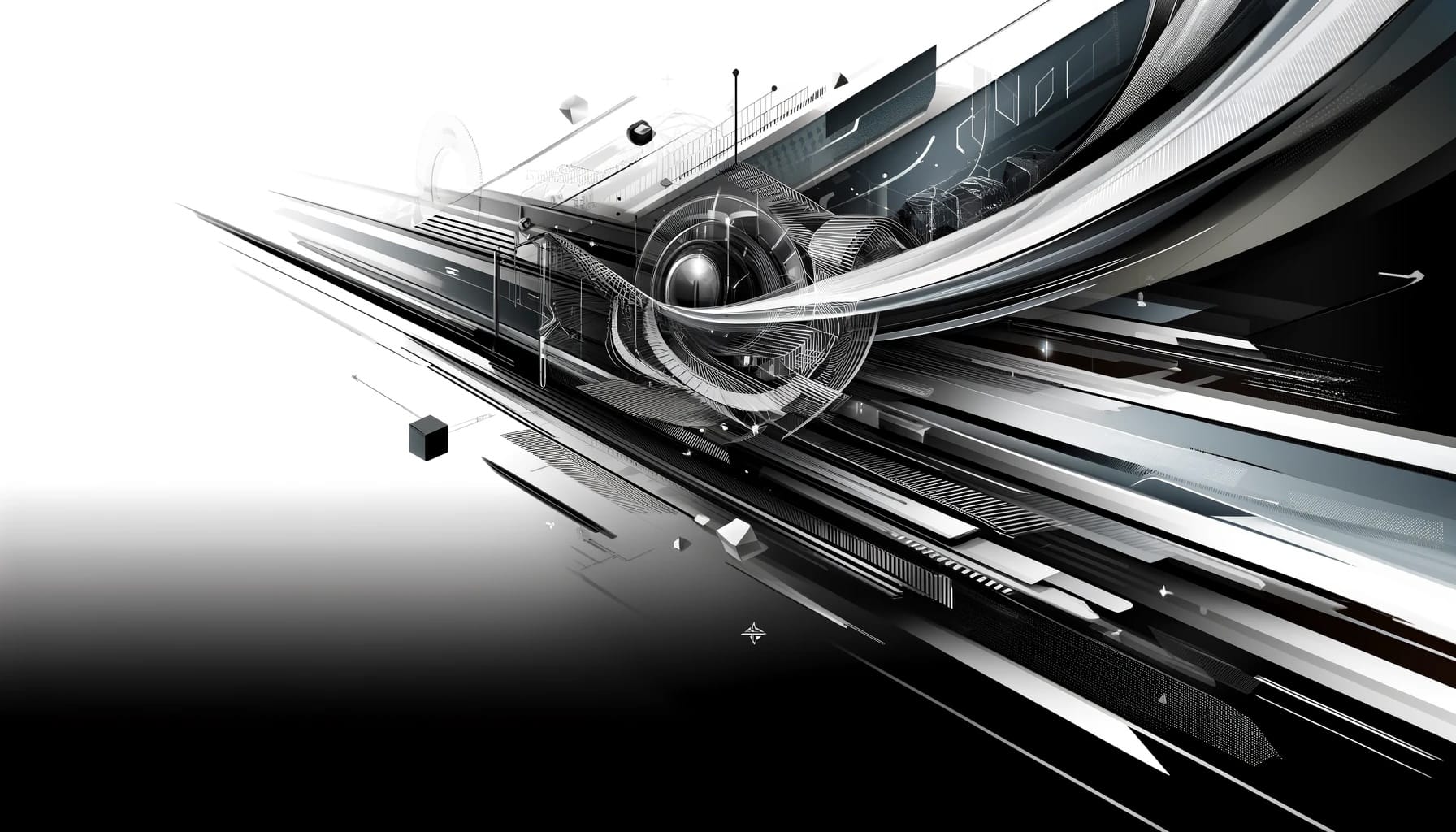
The Garden of Eden and the Original Sin
Nature as Creation
And God said, “Let the water under the sky be gathered to one place, and let dry ground appear.” And it was so. God called the dry ground “land,” and the gathered waters he called “seas.” And God saw that it was good.
A core belief in many religions is that Earth, Humanity and Nature were created by a divine entity, and therefore should not be meddled with. A god or group of gods created the entire universe, so maintaining everything in its current state has intrinsic value. Nature possesses beauty and order, even in the absence of human existence.
This religious perception of Nature often leads to the rejection of technological progress, as something that contradicts the will of the divine creator. Humans, it is argued, should not be creators, and we often hear phrases like "it's unnatural" or "we should not play God" when religiously motivated groups oppose new technologies or societal changes.
Nature as Perfection
“Let the land produce living creatures according to their kinds: the livestock, the creatures that move along the ground, and the wild animals, each according to its kind.” And it was so. God made the wild animals according to their kinds, the livestock according to their kinds, and all the creatures that move along the ground according to their kinds. And God saw that it was good.
Modern ecological movements have embraced the idea of Nature as Creation, perceiving it as a perfect harmony, something immensely valuable and far above humanity. There is overlap between fringe ecological movements and ancient animist beliefs, with an implicit or explicit belief that Earth and Nature are divine, conscious entities which humans should fear.
This leads to the conclusion that the "natural" order should be protected, sometimes even at the expense of humanity. Some modern ecologists may ally with religious groups, viewing technological progress as a form of transgression, something that disrupts the natural order and should, therefore, be restrained.
Nature as human misery
Unto the woman he said, I will greatly multiply thy sorrow and thy conception; in sorrow thou shalt bring forth children; and thy desire shall be to thy husband, and he shall rule over thee.
And unto Adam he said [...] cursed is the ground for thy sake; in sorrow shalt thou eat of it all the days of thy life;
Thorns also and thistles shall it bring forth to thee; and thou shalt eat the herb of the field;
In the sweat of thy face shalt thou eat bread, till thou return unto the ground; for out of it wast thou taken: for dust thou art, and unto dust shalt thou return.
Returning to the initial view of Nature as Creation, there is a common misconception, even among religious people: the belief that Nature– the part of Creation where humans reside– is the perfect place for humans.
In Genesis, Adam and Eve were placed in the famous Garden of Eden, an ideal setting designed specifically for humans, maximizing their well-being and happiness. After the Original Sin, they were expelled from the Garden, and cast into... Nature!
In Genesis, Nature is a punishment, a place where humans must suffer, extract their food from the soil, die in childbirth, and fight one another. The world we live in is a place of sorrow and penance, where we atone for Original Sin.
In the original scriptures, Nature is a diabolical entity, meaning an alien, non-human force. It lies outside the heavenly Garden built for us and is, ultimately, a punishment.
From this perspective, Nature should be preserved, but not because it is perfect. It should be preserved because humans are sinful creatures and deserve to suffer. Any technological progress is pure hubris, humans going against the will of God. Any drug alleviating our suffering, any device increasing food production, any clothing making us warmer is an affront to God. You could argue that supermarkets contradict Genesis, and some religious movements (such as the Amish) do.
Technological progress is the human attempt to create the Garden of Eden
Nature as the realm of possibilities
God blessed them and said to them, “Be fruitful and increase in number; fill the earth and subdue it. Rule over the fish in the sea and the birds in the sky and over every living creature that moves on the ground.”
Life, as far as we know without relying on faith, is the result of statistical trial and error, a thermodynamic phenomenon leading to the assembly of self-replicating molecules, building increasingly complex organisms. There is no logic, no direction, no morality, and no regard for individual persistence or existence. It simply is. It would happen again in the same conditions.
In our secular societies, the idea of assigning a will, even a vague one, to Nature is absurd. Anthropomorphising Nature, which has roots in ancient religions and was perpetuated by our Judeo-Christian culture, creates all sorts of distortions. Nature cannot be hurt, it doesn't hold grudges, and it has no will. The Earth appeared and will disappear, with or without humans.
If a diffuse, broad version of Earth's ecosphere exists as such, we can argue that a major goal of human civilization is to move away from Nature, or at least harness its positive aspects while eliminating the negative ones.
Violent natural behaviors are discouraged in organized societies. Murder, cannibalism or torture are all natural, but no society values them among its members. Viruses and diseases are natural, but no one would call them positive forces for humanity.
Nature is simply a term to describe what lies outside of human control. Depending on its interaction with the human world, it can be either beneficial or harmful. Domesticating fire was the first step in expanding the realm of human control; agriculture was another major one. Instead of relying on our external environment, humanity set out on a quest to control the biosphere and remove the constraints associated with life in the wild.
The ecosphere wasn't made for humans. It wasn't made for anything, really.
We should carve out our own Garden of Eden, using technology to transform energy and raw materials into tangible human benefits
The case for optimism
We often hear pessimistic narratives about the current state of the world. The end is near, things have never been so dire, the Earth is dying, civilization as we know it is about to end. Yet, when you look at the data, things don't look so bleak, and we are well on our way to (re)creating the Garden of Eden:
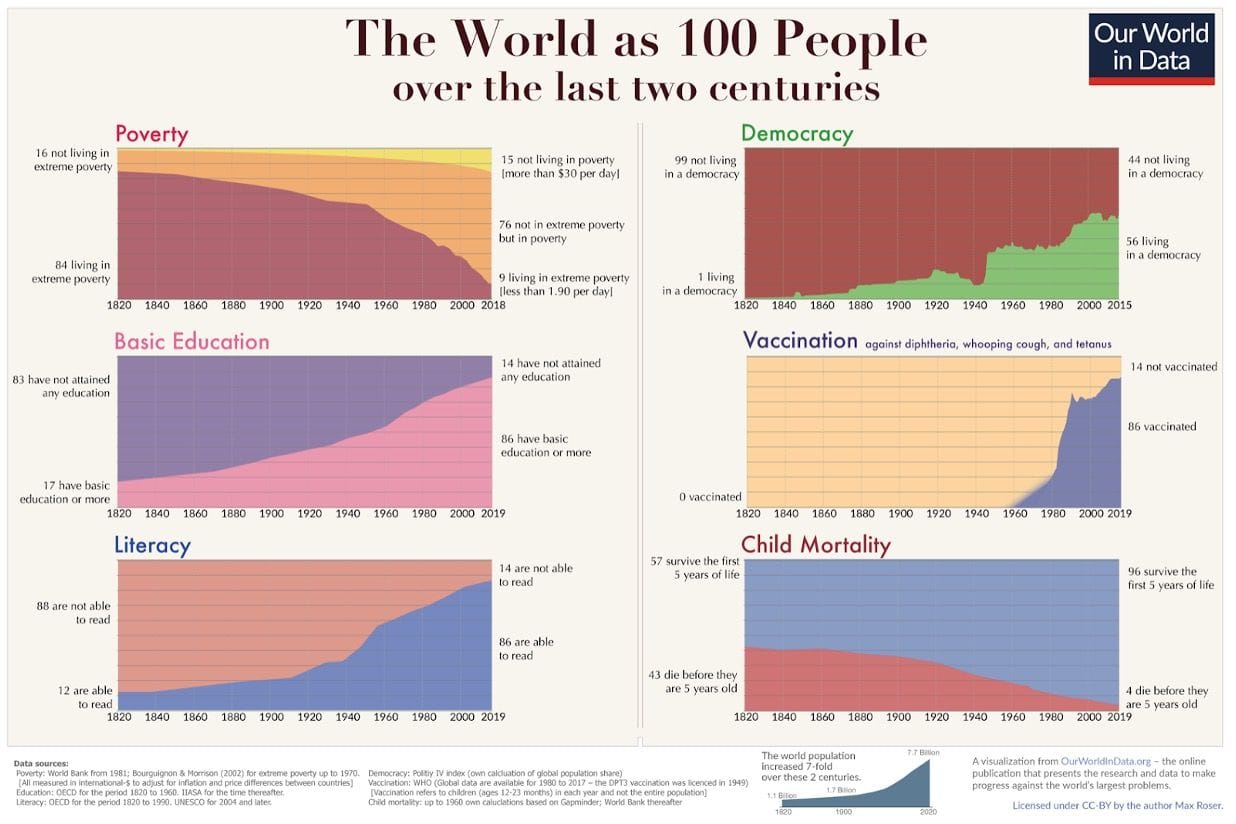
The charts above come from Our World in Data, an excellent source of optimism. There are many more like it. Life expectancy, child mortality, education, eradication of diseases, GDP, poverty, child labor, hunger, free time.... All these indicators are significantly better today than the were 50 years ago everywhere, and do not even compare to the levels they were at 100 years ago. The last 2 centuries have brought unprecedented progress for humans, in all relevant dimensions.

Even when we look at indicators related to more advanced human needs, things are improving. Compared to the late 19th century, the number of hours we have to work has fallen by 50%. People are getting taller, which is a measure of improved nutrition. Global stocks of nuclear weapons have decreased by fivefold since 1990.
At the most basic, physical level, the reason for these improvements is the increased availability of energy and raw materials per person. We have used technology to transform rocks and primary energy into something useful. This is what growth is about. We usually measure it in monetary terms because it is much easier than measuring the availability of energy and raw materials. But at a fundamental level, money is just a human construct, what truly exists is energy and raw materials, made useful by human technology.
Growth in energy and raw materials availability through technology is what made industrial civilization possible, and it is our way of recreating the Garden of Eden
At the same time, if we are being honest, we have also created massive negative externalities. The biggest one is carbon emissions, which cause climate change. If we can continue increasing energy and raw materials availability while minimizing negative externalities and reducing carbon emissions, we should be able to keep improving human well-being overall, without compromising our future.
The degrowth mind virus
The situation is serious, and the climate crisis demands a response if we want to maintain our current living standards. This calls for action, not despair.
Yet we see many degrowth movements (decels) across the political spectrum, who either mirror the religious views of their followers or adopt the idea of Nature as Perfection, integrating into their ideology the belief that humans are sinful creatures who don’t deserve modern comforts, and that technological progress is harmful. They actively promote degrowth, which means reducing the availability of energy and raw materials to humans, in the name of sustainability.
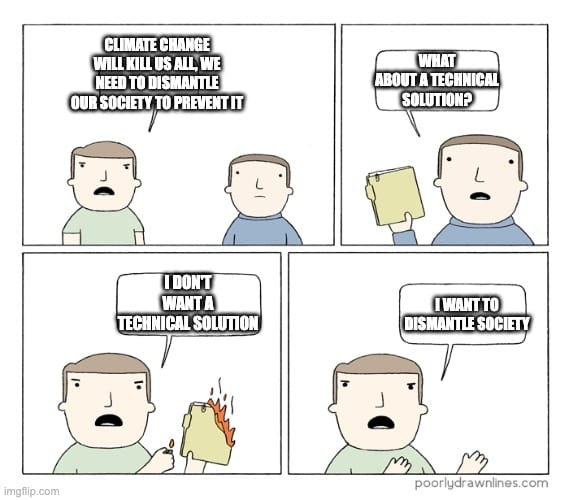
For citizens to accept degrowth, they must first be dissatisfied with the current situation. Decels emphasize an impending catastrophe to advance their degrowth agenda, which will inevitably lower living standards.
The decel way of thinking is pervasive, rooted in deep ideological and cultural norms, and can bring political benefits to its advocates. However, by presenting the current situation in a biased manner and denigrating potential technological solutions, it prevents a rational analysis of modern technologies and progress in general. Instead, dogma takes over.
We equate the analysis of engineers and scientists with the opinions of lobbyists and decels activists, leading to absurd and counterproductive measures from both climate and human perspectives. Not only do we lose sight of reality, we also organize our own powerlessness in the face of the climate crisis by voluntarily crippling our industrial and technological base. This can be seen in energy (nuclear energy vs. fossil fuels), agriculture (GMOs vs. organic), transportation (e-fuels/electricity vs. internal combustion engines), health (vaccines and gene therapies vs. homeopathy), and many other areas.
Most decels are sincere in their commitment and truly see Nature as a positive force, believe that technology is harmful, and that restraining human growth will ultimately benefit humanity.
The problem is not the people, but the ideas: these beliefs are rooted in religion, a legacy of our Judeo-Christian culture, which leads to distortions in how we make decisions, both big and small.
Humans are flawed, imperfect, and sometimes destructive, but we shouldn't assign superior value to Nature outside of human existence. Humans will always be the top priority. The solution to the climate crisis is not in degrowth, but in technological progress and sustainable planetary abundance.
To address the huge challenge of the climate crisis, and maintain the benefits of thermo-industrial civilization without its negative aspects, it is essential to avoid counter-truths and stay as close to reality as possible. We need a rational assessment of the situation, cost-benefits analyses, and a clear understanding of the potential solutions. This cannot be achieved in a single blog post, but I will try to provide some tools to avoid the biggest pitfalls and help us make better collective decisions.
Decel counter truths
Decels, like any other ideologically driven group, will use lies and misconceptions to advance their cause. Using the belief that industrial civilization somehow contradicts the natural order, they seek to create dissatisfaction with the current state of the world, denigrate potential solutions, and slow down the pace of human progress.
Counter truth 1: technology is dangerous
Knowledge is dangerous; humans shouldn’t use powerful technological tools, as those are reserved for gods, and humans should stay in their place.
This is the original decel counter-truth, as old as the myth of Prometheus, who stole fire from the gods. The modern equivalent of Promethean myth is the precautionary principle, which was invented to prevent the broad deployment of nuclear power, perhaps the most catastrophic decision of the 20th century from a climate perspective.
The premise is that the proponent of a technology must demonstrate the absence of any risk associated with it. This is absurd, first because proving the absence of something is logically impossible, and second because no technology is without risk. All we have is cost-benefit analysis. Some technologies pass the threshold and are beneficial, while others do not. We should use those that are favorable and prevent the development of those that are not.
GMOs, particularly Golden rice, exemplify the destructive power of the precautionary principle. Golden rice is a specific variety of rice that contains high levels of beta-carotene, which converts to vitamin A and prevents diseases such as blindness and even death. Despite a consensus deeming Golden Rice safe, NGOs successfully campaigned for its prohibition using the precautionary principle, completely disregarding the massive benefits to millions of people in the name of hypothetical, unproven risks to human health and biodiversity.
Another way to demonstrate the fallacy of the precautionary principle is by looking at historical examples, as highlighted by Pessimists Archive. It is highly instructive to see the moral panics associated with technologies that are now considered essential and obviously safe. Bicycles were once believed to cause “bicycle face,” where a person's face would lock into a permanent grimace. Lightbulbs were thought to cause blindness and destroy romantic relationships. Elevators were blamed for a rise in crime because they allowed burglars to hide.

The cycle is always the same:
- A new technology appears and is initially ignored
- As it gains traction, incumbents dismiss it and argue that it will never work due to technical reasons
- As it spreads and becomes widely adopted, incumbents claim it is dangerous, and a threat to society
Whenever you read about the dangers of a new technology in non-specialist media, remember the headlines about bicycles and elevators, and ask yourself if you’re reading the modern version of those fears.
Counter-truth 2: Small is beautiful
Small is beautiful and big is ugly.
This counter-truth takes many, many forms and can be found everywhere: in the belief that building things yourself is more efficient and more durable than buying them, that getting food from local sources or your own garden is inherently better than buying from a supermarket, and that an artisanal object will always be of better quality than an industrial one.
In reality, the complete opposite is true: small-scale production is more expensive, less efficient, more resource-intensive, and more time-consuming.
Try growing vegetables in your garden, and you will quickly realize how hard it is to achieve a consistent harvest and good yields, let alone be self-sufficient. For a family of four, you will need 1 to 2 hectares of land (3 to 4 acres), so if you’re serious you will invest in more land. Since doing everything by hand is exhausting and labor-intensive, you will buy a tractor. You will scale up. Even then, at the end of the day, your vegetables will likely be far more expensive, in terms of resources, energy, and labor, than those at the supermarket—and they might not even taste better.
Doing things on a small scale is horribly inefficient. A YouTuber demonstrated this by creating a chicken sandwich from scratch, starting in the field. It only took him six months and cost $1,500.
Industrial components are usually of better quality AND cheaper than artisanal ones. This was demonstrated, ironically, by the original decel movement, the Luddites. In the 19th century, textile workers in England started destroying automated textile equipment and steam-powered looms when they realized that machines could do a better job than they ever could, faster and at a fraction of the cost. If they had truly believed in the superior quality of their work, they wouldn’t have felt threatened by the machines.
Washing dishes by hand consumes more water than using a dishwasher for a worst result. All agrarian reforms that aimed to return to subsistence farming have ended in failure and food rationing: think of the Chinese Great Leap Forward or the Special Period in Cuba. After an initial period of hype, microgrids are being quietly shelved around the world. We could on.
When someone pitches a miraculous "small-scale" initiative claiming to have better quality output than an industrial equivalent without technological improvement, it almost always consumes more resources, energy, or labor. The costs may be hidden by subsidies or clever marketing that creates emotional value, but the reality doesn’t change. The miracle "Small is Beautiful” solutions don’t work without massive public subsidies, free human labor, or a significant decrease in the quality of output, which in turn lowers the standard of living for consumers. They produce inferior goods at a higher cost.
We are surrounded by industrial-scale products that would have been unimaginably luxurious for someone a hundred years ago. Food is an obvious example. We should recognize the miracle of supermarkets and imagine how wild this abundance would appear to someone from the 15th century. At the same time, the share of the domestic budget spent on food has been decreasing for decades.
As for everyday objects, we should appreciate small, ubiquitous things like pens. Bic-type pens are actually wondrous: they represent the mastery of multiple materials, are mass-produced so efficiently that they are nearly free, globally accessible, and have democratized education and knowledge.
Everything with a network effect functions better at a bigger scale, along with several public services. We collectively decided to scale up, and pool resources to ensure optimal benefits. Dense habitats are much less costly to build and maintain than low-density, individual houses. Public transportation consumes far less energy and raw materials than individual cars while providing a similar benefit. Small clinics are less safe than large hospitals and have lower recovery rates because doctors perform interventions less frequently, and if something goes wrong there is no backup. Large universities can conduct research and experiments that would be unreachable to smaller institutions.
Counter-truth 3: less production = less negative externalities
Decreasing production or decreasing benefits to humans, will decrease the associated costs, whether in terms of energy or raw materials, and consequently reduce environmental harm.
This is not how progress and technological advances work. You can achieve more output with less input through a significant technological leap, and conversely, you can actually increase costs and negative externalities even as you decrease your output.
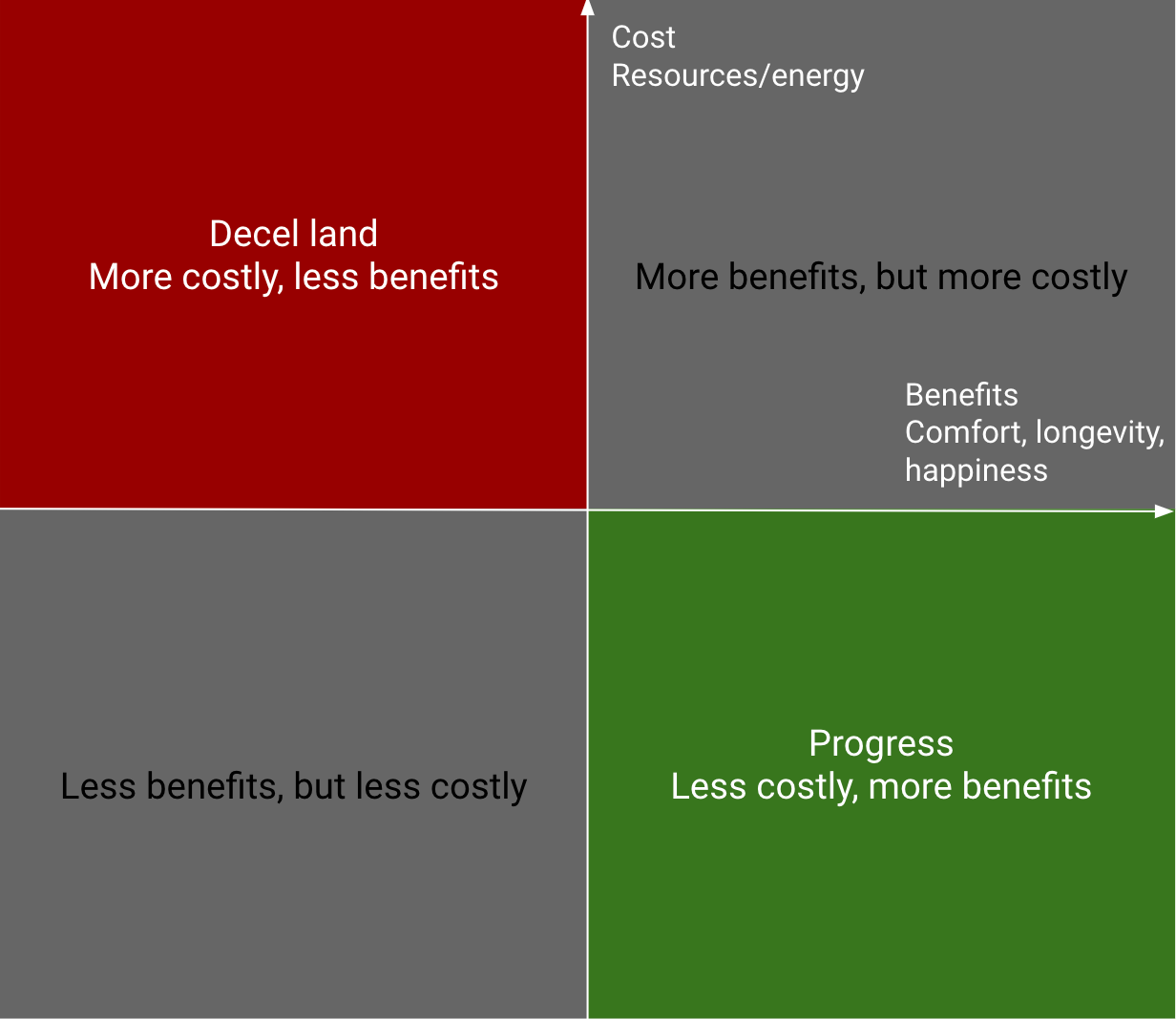
In 1798, Thomas Malthus famously predicted that world population growth would be limited due to food shortages. But then we found a method to get nitrogen out of thin air (literally), and the development of nitrogenous fertilisers led to a steady food supply, for a population ten times larger than in Malthus’ era, with yields still increasing today. Modern agriculture have allowed the decrease of the amount of land necessary to get the same amount of food.
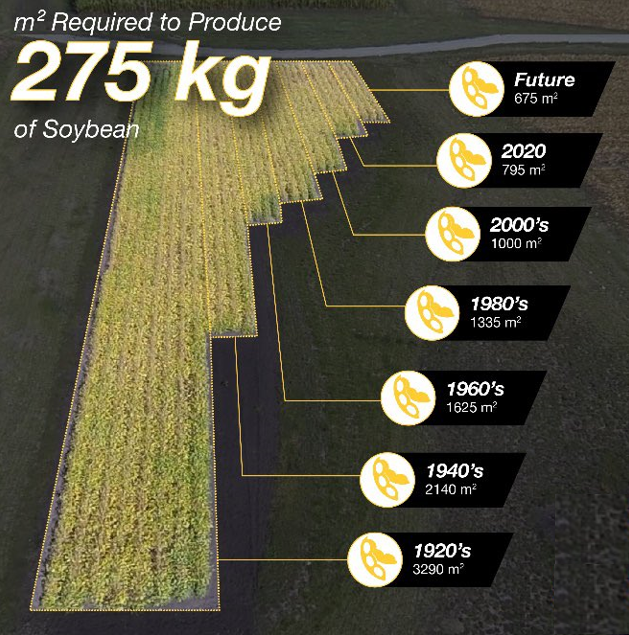
The Stone Age didn’t end because we ran out of flint, but because we found more efficient ways to make and use tools.
There is a sequence in Silicon Valley that references the Great horse manure crisis of 1894. In the early 20th century, many believed urban development would be halted as sprawling cities would drown in horse manure. The problem simply disappeared when internal combustion engines were introduced.
This story might be apocryphal, but it illustrates the fallacy of degrowth. Slowing down production will never solve a problem in the same way that introducing a new technology will. You may get less manure, but you’ll never eliminate it the way modern transportation did, and you will limit the population’s ability to move around.
Counter-truth 4: technology should be transparent
If a technology is too complex, it is dangerous. If it cannot be explained to everyone, it will create hidden dangers. If there are unknowns, not matter how far downstream, we should not deploy it.
The essence of human society is to divide labor to increase the common good, and in doing so, lose the individual understanding of all the parts. This ability to collaborate with strangers and specialize may be the greatest advantage our species has. Beyond the obvious skill issue involved in making everything transparent, complexity is necessary for many great advancements, and uncertainty about potential second or third-degree effects should not disqualify a technology. Risks should be managed, no suppressed.
It is a profoundly erroneous truism that we should cultivate the habit of thinking of what we are doing. The precise opposite is the case. Civilization advances by extending the number of important operations which we can perform without thinking about them.
Alfred North Whitehead
A recent example is LLMs and AI, where the supposed complexity and potential risks are being used to justify regulatory capture. The same applies to nuclear energy, where opponents often argue that the complexity of a nuclear reactor makes it inherently dangerous.
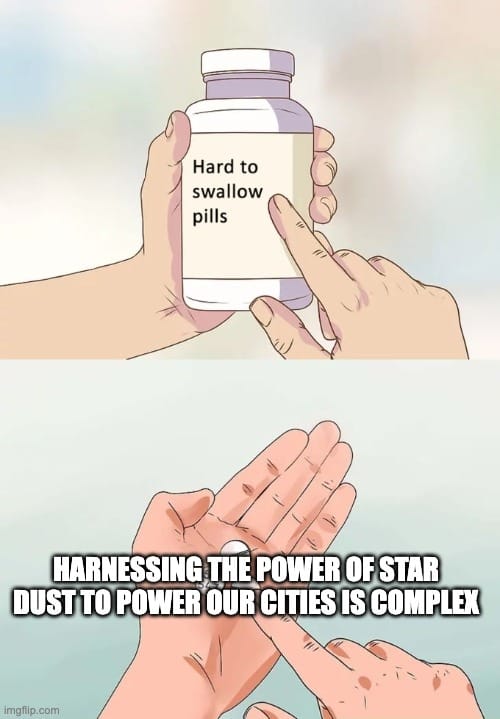
Another version of the “technology should be transparent” idea is the notion that we should be able to repair objects ourselves, and that things were better in the past when you could fix your car or fridge on your own on a Saturday afternoon.
First, there is a massive survivorship bias here. Things were not necessarily more resilient in the past; it’s just that the toaster in your grandmother’s house that lasted 20 years was an outlier, and you have forgotten the countless other objects that broke down. Second, as technology advances, it’s normal that we are less able to repair things on our own. This is simply a by-product of specialization. A horse can maintain itself, a steam engine is a bit harder to maintain, and a modern jet engine requires advanced equipment. This is logical and directly correlated with the benefits brought by each technology.
Do you think all the Romans knew how the Cloaca Maxima worked? That all Babylonians understood how to build palaces or sailboats? Imagine if you had to comprehend all the intricacies of energy generation and electrical engineering just to use a lightbulb, or fully grasp the complex systems involved in water pumping and sanitation to use a tap.
They aim to create solidarity within small communities, without recognizing that it naturally leads to larger human structures with more distant interdependencies.
Autarky breeds poverty, violence, hostility, and it destroys human collaboration. Interdependency is a great strength that reinforces our shared humanity. Globalization is the ultimate form of interdependency, and centuries of war were ended when European countries chose to build strong, interdependent relationships and pool their resources.
We shouldn’t limit ourselves to close, “small-scale” relationships but should strive to make our communities as large as possible to ensure that conflicts are resolved through law and negotiation, rather than violence.
Counter-truth 5: our uses of technology are futile
We are encouraged by technology to waste energy and raw materials on trivial uses, and the pollution generated could be avoided entirely if people focused on what truly matters.
This is a classic decel straw man. Whenever they need to denigrate a technology, they highlight its most frivolous or futile use without mentioning its benefits. I recall a quote from an elected official claiming that 5G would be used to “watch porn in HD.” Well, maybe, but it will also be used in healthcare for remote surgery, in agricultural drones to reduce pesticide use, and in self-driving cars to lower road fatalities. There should be a cost-benefit analysis, not a caricature of its uses.
Space programs are similarly portrayed by decels as futile, merely a way to get faster internet or to allow the rich to go to space. But space programs are the reason we can communicate globally for free, the reason we have reliable GPS and weather forecasting, and they may one day unlock unlimited mineral resources.
Smartphones might be used for Candy Crush and taking selfies with your cat, but that doesn’t mean they aren’t useful in many other contexts.
When considering the climate crisis, carbon emissions are driven by sectors that are hardly futiles: the largest emissions come from manufacturing (with steel and cement production at the top), electricity generation, and agriculture. Not something you do for fun. Thinking that we could simply eliminate the foolish uses of energy and raw materials is an illusion. No one will agree on what is necessary and what is superfluous, and the vast majority of emissions are linked to basic human needs: a long, healthy life, a comfortable home, good food, and leisure time.

Counter truth 6: natural is better than artificial
First, there is a general confusion about what is artificial and what is natural. Virtually everything that surrounds us today has been modified by humans. Even our plants have been extensively altered, and our pets are evolved versions of their wild ancestors. A fun exercise is to compare the wild and modern versions of fruits and vegetables:
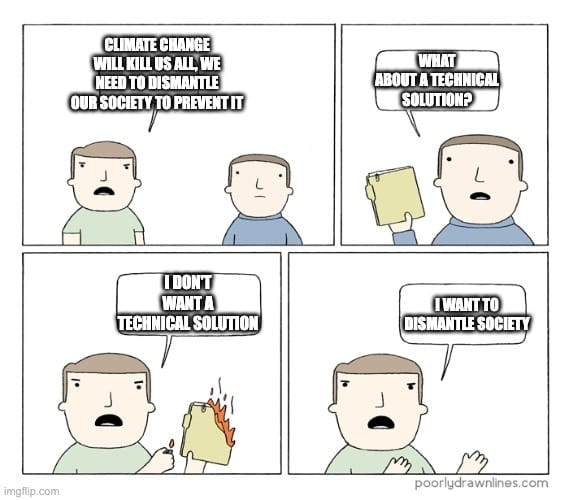

No one would recognize modern fruits and vegetables before the agricultural revolution. We have profoundly altered them using increasingly advanced techniques to feed ourselves, and if they are natural, then so are steel and concrete.
The line between natural and artificial is blurry at best, and often labeling something as “natural” is just a marketing tactic. The same applies when something is called “chemical” to discredit it. Humans are literally bags of chemicals suspended in water, and for a non-specialist, it is impossible to say whether something is harmful or beneficial.
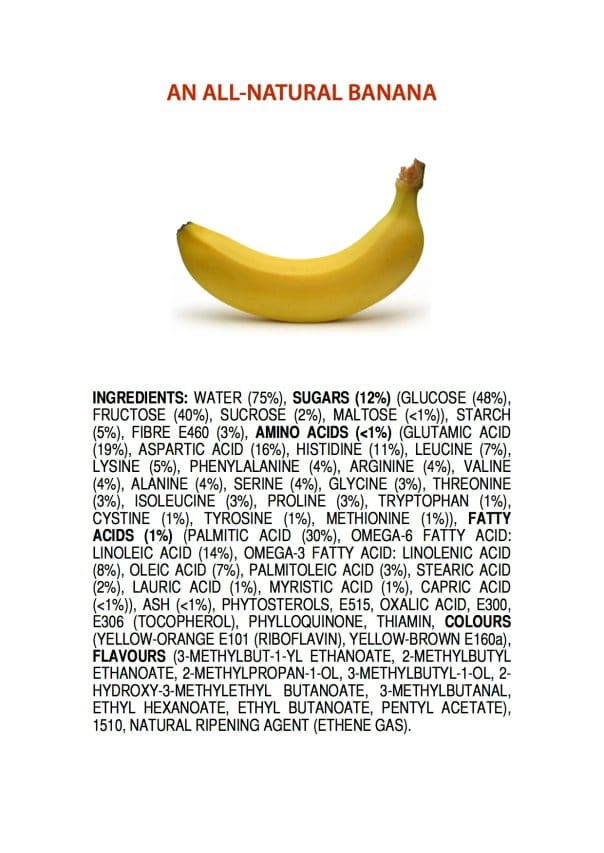
Did you know you drank 1,3,7-trimethylxanthine this morning? Organic chemistry naming conventions are scary, deal with it.
The idea that natural is necessarily good while artificial is necessarily toxic is false, as is the opposite. Some natural things are wonderful and put to great use by human technology, while others are deeply noxious and should be avoided or eradicated. Most will be in-between.
An extra counter-truth about knowledge: patents are terrible
Patents are an avatar of greedy capitalism and proof that mega-corporations own the planet.
The idea behind a patent is that you must thoroughly describe an invention for it to be protected for 20 years. After that, it becomes public property. Patents are actually a great tool for disseminating knowledge.
Patents are the reason we have generic drugs. The original lightbulb was patented, allowing for improvements on Edison’s design once the patent expired. The transistor was patented by Bell Labs and later became a foundational building block of modern electronics. Patents are awesome.
Be optimistic, build the industrial infrastructure of the future and climb the Kardashev scale
To convince citizens that degrowth is the obvious solution to the climate crisis, you first have to make them believe that the current state of the world is terrible. Next, that the path we are currently on, increasing energy and raw materials availability through technology, leads to disaster. Finally, you need to persuade them that degrowth would lead to a better world.
All of this is a lie, and the data tells a different story, where progress has brought massive benefits to humanity. Billions of people have been lifted out of poverty, the vast majority of the global population now has enough to eat, can read and write, and has been freed from hard manual labor. There are certainly issues: we still emit too much carbon, industrial accidents still happen too often, many humans don't have access to basic infrastructures, and an error in a lab can have catastrophic consequences. We can improve, but we already have technological solutions available, and abandoning everything would lead to widespread suffering.
Contrary to what decels claim, we never lost sight of the goal of progress. We want long, healthy lives, nutritious food, comfortable homes, fulfilling relationships, and free time to pursue our passions. We want to create our own Garden of Eden. We want to reach sustainable abundance, and a post-scarcity world. We want to climb the Kardashev scale. This is what progress has always been about.
We must maximise energy and raw materials availability through technology to achieve sustainable abundance for all humans
Millions of scientists and engineers have dedicated their lives to building and improving systems aimed at creating a human Garden of Eden. Billions of cumulative years have been invested in technological progress. Our recent ancestors built a great industrial civilization, the most prosperous and advanced in history. We must not slow down; we must accelerate. We can achieve sustainable abundance if we make the right choices, build the industrial infrastructure of the future, and resist falling into religious millenarian thinking.
We believe rich is better than poor, cheap is better than expensive, and abundant is better than scarce.
We believe in making everyone rich, everything cheap, and everything abundant.



